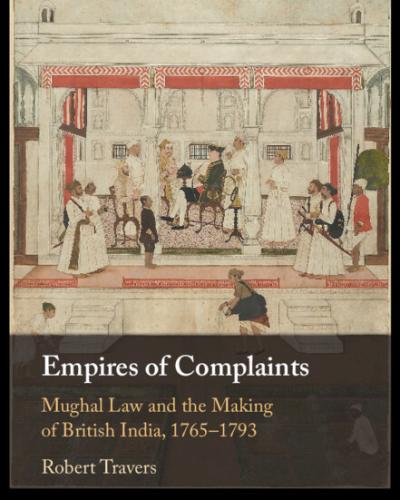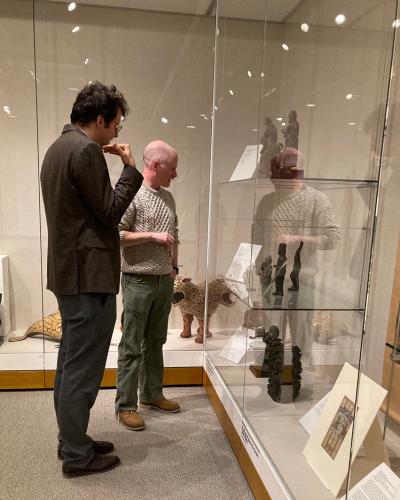The Fellows’ Q&A series continues with a spotlight on Robert Travers, Professor of History at Cornell University and 2017-18 “Corruption” Faculty Fellow. His monograph Empires of Complaints: Mughal Law and the Making of British India, 1765–1793 (Cambridge University Press, September 2022), honorable mention for the James Willard Hurst Book Prize (Law & Society Association), evolved out of research during the Fellowship year.
Big Picture
Empires of Complaints offers a new account of the transition from Mughal to British rule in eighteenth-century eastern India. It argues that the British East India Company built a new colonial state in Bengal by expropriating and recasting deep-rooted Mughal, Persianate infrastructures of governance and ideas of just rulership. It focusses especially on judicial mechanisms of state-formation, showing how British rulers selectively adapted Mughal venues and protocols for doing justice to petitioning subjects, and how Indian petitioners invoked the memory of Mughal justice in making claims on the colonial state. Drawing on English and Persian sources, I explore how a modern colonial rule of law in India was established by co-opting and transforming Islamicate, Persianate practices of claims-making and imperial adjudication, and how Indian subjects continued to draw on Mughal history as a source for alternative ideas of imperial justice.
In Particular
One of the discoveries I made in researching the book was the importance of an institution called the ‘khalsa’ in the growth of Calcutta as the new British capital of Bengal. This was a reconstituted version of the Mughal khalisa sharifa, a central office of tax collection in late Mughal Bengal that was relocated by British conquerors to Calcutta in 1772. Reading through records of the khalsa (housed in the West Bengal State Archives in Kolkata), I realized that the khalsa was not just a center for revenue collection but also a venue for petitioning the state to seek redress of grievances and adjudication of disputes. By tracing judicial inquiries into land and tax disputes at the khalsa, I was able to show how British officials drew selectively on the representations of Indian officials and litigants to construct their own rule of law as a reformed system of Mughal law.
Discovery
Reading the numerous petitions (often translated from Persian) that came to the khalsa, I was surprised by how quickly Indian subjects from all over Bengal, especially landlords and merchants, learned to petition colonial rulers for protection of their local claims. This gave me a sense of how colonial state-formation depended on co-opting long-established Persianate practices of claims-making through which subjects sought imperial recognition of local entitlements. Whereas historians of early colonial Bengal have usually focused on British-made legislation, or on the British codification of ‘religious’ forms of Muslim and Hindu law, I began to see colonial law grew out of judicial encounters between British officials and Indian litigants referencing Persianate, Mughal norms for authenticating land rights. This helps to explain why the British preserved Persian as an official language of government in India well into the nineteenth century.
Fellowship
My fellowship at the Society was crucial for developing my ideas, not least because of the support and encouragement I received from the Society director and the other fellows. Corruption has long been a major theme in the history of early colonial India, but mostly historians have focused on British ideas of corruption and how these were applied to reforming colonial rule. I became interested in how Indian officials and petitioners had their own ideas of corruption drawing on Persianate theories of ethical rulership, and how they used these to make claims on colonial rulers. In the book, I suggest how the British increasingly sought to develop a new system of written regulations (effectively rewriting Mughal law), and to consolidate the power of British officials in a racialized administrative hierarchy, in order to contain the perceived political threat posed to colonial authority by clamorous Indian petitioners.






